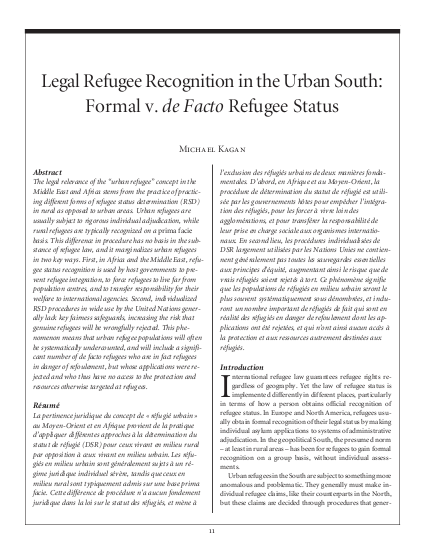
The legal relevance of the “urban refugee” concept in the Middle East and Africa stems from the practice of practicing different forms of refugee status determination (RSD) in rural as opposed to urban areas. Urban refugees are usually subject to rigorous individual adjudication, while rural refugees are typically recognized on a prima facie basis. This difference in procedure has no basis in the substance of refugee law, and it marginalizes urban refugees in two key ways. First, in Africa and the Middle East, refugee status recognition is used by host governments to prevent refugee integration, to force refugees to live far from population centres, and to transfer responsibility for their welfare to international agencies. Second, individualized RSD procedures in wide use by the United Nations generally lack key fairness safeguards, increasing the risk that genuine refugees will be wrongfully rejected. This phenomenon means that urban refugee populations will often be systematically undercounted, and will include a significant number of de facto refugees who are in fact refugees in danger of refoulement, but whose applications were rejected and who thus have no access to the protection and resources otherwise targeted at refugees.
Resource collections
- UN Habitat - Urban Response Collection
- Urban Response - Urban Crisis Preparedness and Risk Reduction
- Urban Response Collection - Community Engagement and Social Cohesion
- Urban Response Collection - Economic Recovery
- Urban Response Collection - Environment and Climate Change
- Urban Response Collection - Housing, Land and Property
- Urban Response Collection - Urban Crisis Response, Recovery and Reconstruction
- Urban Response Collection - Urban Resilience